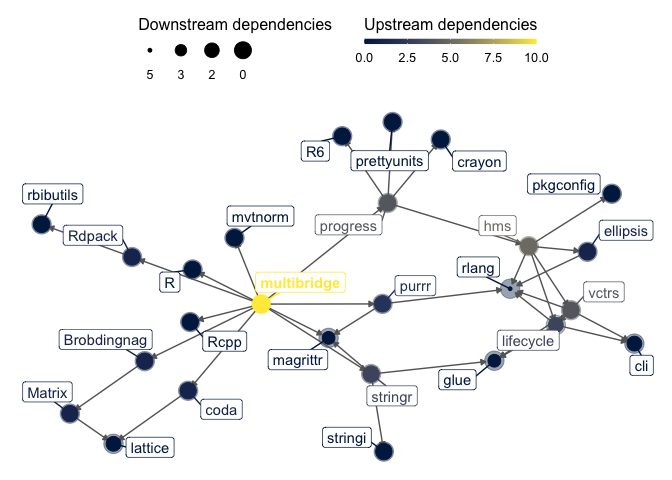


Evaluates hypotheses concerning the distribution of multinomial proportions using bridge sampling. The bridge sampling routine is able to compute Bayes factors for hypotheses that entail inequality constraints, equality constraints, free parameters, and a mix of all three. These hypotheses are tested against the encompassing hypothesis, that all parameters vary freely.
System requirement is the library mpfr with a version
bigger than 3.0.0. To install mpfr, you need a
C compiler, preferably GCC. Detailed information on how to install
mpfr are available at https://www.mpfr.org/mpfr-current/mpfr.html.
On Mac you can install mpfr through the Terminal
(assuming that brew is installed on your machine).
brew install mpfrOn Debian or Ubuntu you can install mpfr through the
Terminal:
sudo apt-get install libmpfr-devYou can install the released version of multibridge from
CRAN with:
install.packages("multibridge")And the development version from GitHub with:
# install.packages("remotes")
remotes::install_github("ASarafoglou/multibridge")On https://mac.r-project.org/tools/ follow the instructions for gfortran:

This is a basic example which shows you how to solve a common problem:
library("multibridge")
# data
x <- c(3, 4, 10, 11, 7, 30)
# priors
a <- c(1, 1, 1, 1, 1, 1)
# category labels
factor_levels <- c('theta1', 'theta2',
'theta3', 'theta4',
'theta5', 'theta6')
# constrained hypothesis
Hr <- c('theta1', '<', 'theta2', '&',
'theta3', '=', 'theta4', ',',
'theta5', '<', 'theta6')
output <- mult_bf_informed(x, Hr, a, factor_levels, seed=2020, niter=2e3)
m1 <- summary(output)
m1
#> Bayes factor analysis
#>
#> Hypothesis H_e:
#> All parameters are free to vary.
#>
#> Hypothesis H_r:
#> theta1 < theta2 & theta3 = theta4 , theta5 < theta6
#>
#> Bayes factor estimate LogBFer:
#>
#> -2.4239
#>
#> Based on 1 independent equality-constrained hypothesis
#> and 2 independent inequality-constrained hypotheses.
#>
#> Relative Mean-Square Error:
#>
#> 6.29e-05
#>
#> Posterior Median and Credible Intervals Of Marginal Beta Distributions:
#> alpha beta 2.5% 50% 97.5%
#> 1 theta1 1 + 3 5 + 62 0.0158 0.0522 0.120
#> 2 theta2 1 + 4 5 + 61 0.0236 0.0664 0.140
#> 3 theta3 1 + 10 5 + 55 0.0811 0.1520 0.247
#> 4 theta4 1 + 11 5 + 54 0.0918 0.1660 0.264
#> 5 theta5 1 + 7 5 + 58 0.0507 0.1090 0.195
#> 6 theta6 1 + 30 5 + 35 0.3240 0.4360 0.553